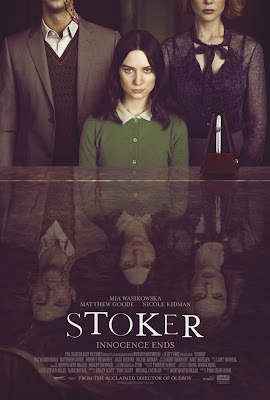‘Stoker’ Shows The Deadly Bonds That Tie Families Together
Stoker: 4 out of 5
India:
We don’t need to be friends, we’re family.
Stoker is the English-language debut of Korean
director Park Chan-wook, who has previously made thrillers such as Oldboy
and Lady Vengeance, which are known for depicting brutal subject matter
within the frame of beautifully executed visuals. Those familiar with his
work can see that Chan-wook has a deep appreciation for filmmakers such as
Hitchcock and he has gone on to make films that echo that sort of work at a
more extreme level. Stoker is very much indebted to Hitchcock, as
well as Brian DePalma, among others, given how the film portrays a level of
suspense in such an effective manner. The film is a psychological drama
as well as an American Gothic horror film that Park Chan-wook really directs
the hell out of.
The film
begins with teenager India Stoker (Mia Wasikowska) and her mother Evelyn Stoker
(Nicole Kidman), along with many others, observing the funeral for India’s
father, Richard Stoker (Dermot Mulroney). We soon learn that India had a
very close relationship with her father, but not so much with her mother, which
leaves the two of them being somewhat estranged in the large Victorian house
they live in.
Enter
Charlie (Mathew Goode), the lost brother of Richard, who has arrived at the
funeral and decides to stay with the girls for a time, as a matter of good
faith. India is taken aback, as she never even realized she had an uncle,
while Evelyn is happy to receive some sort of comfort. Other family
members and people that work at the Stoker house are skeptical of Charlie’s
presence as well, as he is a very enigmatic figure to say the least.
Charlie is well-spoken, wise, and quite presentable, but something about him
definitely seems either suspicious or intriguing to India.
The
enjoyment of this film comes not only from how the plot slowly reveals itself,
but from how Park Chan-wook depicts those events. This is a very
‘directed’ film, by which I mean that the film really wants to present itself
in an overt way; not with aggressive camera work, but in an elegant and stylish
manner. The house feels like a character in this film from the way the
camera moves through and around it. Each character is framed differently,
creating a unique approach for each perspective we see. Many call-backs
to past scenes and layered storytelling make the film’s visuals a key to
understanding it, even if the film were to be dialogue-free. Stoker is
deliberately paced, but has a weird energy to it, which Park Chan-wook was
happy to capture with his operatic filmmaking sensibilities, fitting for a
thriller of this type.
Regarding
the actors, I really enjoyed this cast, who seemed to get exactly what kind of movie
they were making, which had me imagining what kind of film could come from
having the same cast working with Chan-wook on his version of an American Oldboy, as opposed to the version we will be
seeing this year, under the direction of Spike Lee (though I am intrigued).
Mia Wasikowska, in particular, is very good in a role where saying that she is
introverted would be an understatement. The character she plays is very
peculiar in the way we slowly understand the relationship she has with her
family, what gets her down, and most importantly, what gets her excited.
Given that the script by Prison Break star Wentworth Miller (I know,
right?) was very much influenced by Hitchcock’s Shadow of a Doubt, it
seems quite clear that Teresa Wright’s character in that film was flipped on
its head to develop the character of India. On the other hand, Mathew
Goode, an actor who I think can be very good, does a great job of playing the
Joseph Cotton character from Shadow of a Doubt, but with differences
that apply to being a figure within this gothic fairytale that India is living
out. I am certainly not saying that Stoker is as good as Shadow
of a Doubt by the way, but the comparison feels quite fitting and the
actors are easily emblematic of the characters in that film, but in a twisted
sort of way. I also do not want to talk down Nicole Kidman, as she is
effective as well, but not nearly as prominent as the other two.
If I
really wanted to continue the comparison game though, Stoker actually
feels very similar to a film like Black Swan. Both films have a
visually haunting quality to them, feel very operatic in their direction, and have
effective scores by Clint Mansell. The sound design is also very
deliberate in the way it adjusts little elements to fully take over certain
scenes. They also both rely on the lead characters delving into a side of
themselves that they have been capable of exploring all along, but are provided
with a catalyst during the course of the story in each film that leads to very
‘interesting’ results. While the two
films have what I would say is a dissimilar goal in mind, they do operate on a
similar dark level, with moments of dark humor sprinkled in throughout.
If some of
my descriptions have seemed vague, it is because I obviously do not want to
reveal too much about this film. Yes, the film is a thriller-type, which
could give away the fact that violence of some kind may occur, but I was really
happy to go into this film fairly fresh and not be spoiled by knowing too many
details. Stoker is a superb mystery that is elevated by its actors
and very involving direction. Whether or not the viewer figures out where
the film is going, I was really wrapped up in the strangely intriguing journey
to get there, let alone the beautiful visuals, however dark they may be.
Evelyn:
You know, I've often wondered why it is we have children... and the
conclusion I've come to is: we want someone to get it right this time.
But not me. Personally speaking, I can't wait to watch life tear
you apart.
Aaron
is a writer/reviewer for WhySoBlu.com.
Follow him on Twitter @AaronsPS3.
He also co-hosts a podcast, Out Now with Aaron and Abe, available via iTunes or at HHWLOD.com.
He also co-hosts a podcast, Out Now with Aaron and Abe, available via iTunes or at HHWLOD.com.











Comments
Post a Comment